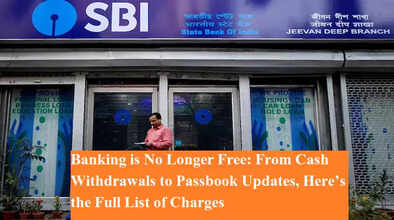Banking is No Longer Free: From Cash Withdrawals to Passbook Updates, Here’s the Full List of Charges

Banking Has Turned Costly: Why Every Service Now Comes with a Price Tag
In today's world, opening a bank account is easier than ever before—but maintaining one has become increasingly expensive. Over the past few years, banks have gradually shifted from offering free services to implementing charges on nearly every transaction or facility. What was once complimentary—such as cash withdrawals, passbook updates, or even basic information requests—is now billed with additional costs. Let’s take a closer look at how banking has become more burdensome for the average customer.
Even Basic Services Are No Longer Free
Gone are the days when you could walk into a bank branch and get your passbook updated without a fee. Now, even minor services like updating your passbook or verifying a signature come at a price. As of May 2025, most banks have started charging ₹23 for withdrawing money more than five times from an ATM. Additionally, beginning July 1st, new charges have been introduced on select credit card transactions as well.
Costlier Cash Transactions at Branches
Cash transactions, one of the most commonly used banking services, are now under tighter restrictions and higher charges. Several banks only allow up to three free deposits or withdrawals per month. Beyond that, customers are charged up to ₹150 for each additional transaction. Furthermore, if you deposit more than ₹1 lakh in cash in a single month, you could incur an extra fee of ₹150—even if it’s your own account.
Reduced Benefits for Customers
In addition to increasing charges, banks are also cutting down on customer perks. For example, SBI recently discontinued the free ₹50 lakh air accident insurance benefit that came with its Prime and Pulse credit cards. This change took effect from July 15, 2025, and serves as a clear example of shrinking customer advantages even as service fees climb.
IMPS Transfers to Be Chargeable from August
Instant Money Payment System (IMPS), which was once a free and convenient way to send money instantly, is also becoming chargeable. Starting August 15, 2025, SBI will introduce charges for IMPS transactions above ₹25,000. The charges will range from ₹2 to ₹10, plus applicable GST. Previously, transactions up to ₹5 lakh were free, but that convenience will soon come with a price.
Charges on Nearly Every Service
Running a bank account now means paying for even the smallest of services. Here's a list of some common charges:
-
Duplicate passbook issuance: ₹100
-
Signature verification: ₹100–₹150
-
Cheque stop request: ₹200
-
Mobile number or email update: ₹50 + GST
-
Reissue of debit card PIN: ₹50
These additional costs can pile up quickly, especially for customers who regularly rely on in-branch services.
What Should Customers Do?
As banking becomes increasingly monetized, customers must stay informed about their bank's service charges and terms. The best way to avoid unnecessary fees is to:
-
Review the fee structure of your bank account regularly.
-
Use digital services and mobile apps, which are often cheaper or free.
-
Limit physical transactions and opt for UPI, internet banking, or mobile wallets wherever possible.
-
Track monthly limits for free withdrawals and deposits to avoid extra charges.
Final Thoughts
Banking in 2025 is no longer the affordable and customer-friendly experience it used to be. With charges creeping into every corner of financial services—from cash withdrawals and deposits to simple account updates—customers are bearing the brunt. As the landscape continues to shift, staying informed and choosing digital alternatives could be the key to saving money in this new era of fee-heavy banking.

